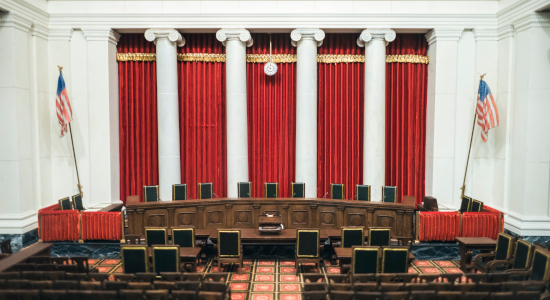
June 1, 2020 – The U.S. Supreme Court today denied a petition for writ of certiorari in a case challenging the mandatory status of the State Bar of Wisconsin.
The petition, filed by attorneys Adam Jarchow (Clear Lake) and Michael Dean (Brookfield), argued that the First Amendment does not allow compelled membership (and dues) in the organization as a condition of practicing law in Wisconsin.
However, in Keller v. State Bar of California, 469 U.S. 1 (1990), the U.S. Supreme Court unanimously upheld mandatory bar dues if objecting members are not compelled to fund activities not germane to regulating the legal profession or improving the quality of legal services.
The Keller court restricted the activities that could be funded with mandatory dues to ensure that free speech and free association rights were protected, while recognizing the important interest in protecting the public by improving the quality of legal services.
Wisconsin Supreme Court Rule (SCR) 10.03(b)1 reflects the Keller holding, noting the State Bar of Wisconsin “may not use the compulsory dues of any member who objects … for activities that are not necessarily or reasonably related to the purposes of regulating the legal profession or improving the quality of legal services.”
The petitioners in Jarchow v. State Bar of Wisconsin argued that Keller should be overturned. In denying the petition, the U.S. Supreme Court declined to take up that issue. The denial preserves the Keller holding with respect to mandatory bars.
Justice Clarence Thomas and Justice Neil Gorsuch dissented. They noted the petitioners’ allegations that the State Bar uses mandatory dues to lobby on legislation. They concluded the court “should reexamine whether Keller is sound precedent.”
The State Bar of Wisconsin’s elected Board of Governors, which represents all lawyers in 16 administrative districts, oversees policy making and operation of the organization.
Some of the State Bar’s 24 sections, which members can opt to join and pay section dues, lobby on legislation and have their own elected board members.
Through an annual Keller rebate process, objecting members can obtain a refund for dues deemed nonchargeable to mandatory dues, currently $260 per year for full, active members. Membership dues account for about 46 percent of the State Bar’s revenue.
The annual calculation of expenditures deemed nonchargeable to mandatory dues includes expenditures that relate to activities that constitute direct lobbying on policy matters before the Wisconsin Legislature and U.S. Congress, regardless of whether they would otherwise qualify as chargeable under a Wisconsin Keller dues analysis.
The petitioners in Jarchow first filed their case in the U.S. District Court for the Western District of Wisconsin, but U.S. District Judge Barbara Crabb dismissed the case late last year, concluding “Keller still binds this court.”
The U.S. Court of Appeals for the Seventh Circuit issued a summary affirmance, ruling that current U.S. Supreme Court precedent on mandatory bars is clear and only the U.S. Supreme Court can revisit the issue. The U.S. Supreme Court declined to do so.
The State Bar is also defending against a similar lawsuit filed in the U.S. District Court for the Eastern District of Wisconsin by Pewaukee attorney Schuyler File. The case is still pending before U.S. District Court Judge Lynn Adelman.
Related Articles
U.S. Supreme Court May Hear Mandatory Bar Case from Wisconsin – WisBar News (Jan. 3, 2020)
Federal District Court Dismisses Lawsuit Against the State Bar of Wisconsin – WisBar News (Dec. 12, 2019).
State Bar of Wisconsin Faces Second Federal Challenge to Mandatory Status – WisBar News (Oct. 1, 2019).
Lawyers Challenge State Bar’s Mandatory Status in Federal Lawsuit – InsideTrack (May 1, 2019).
